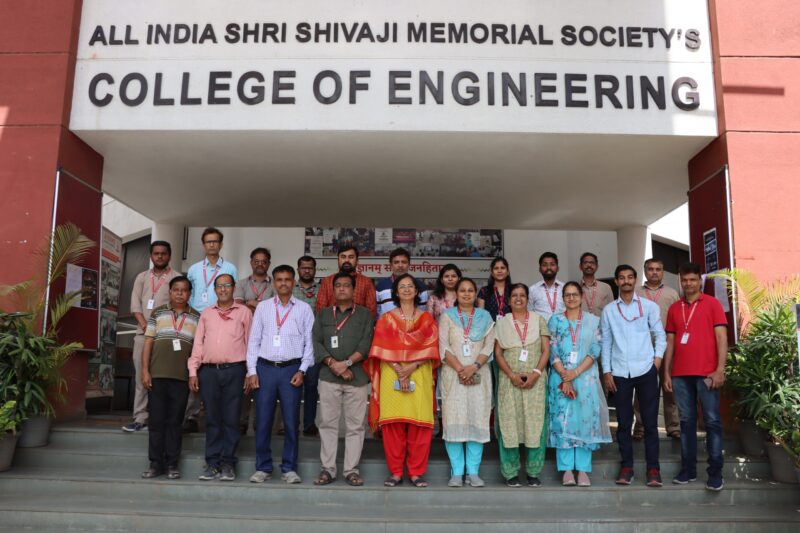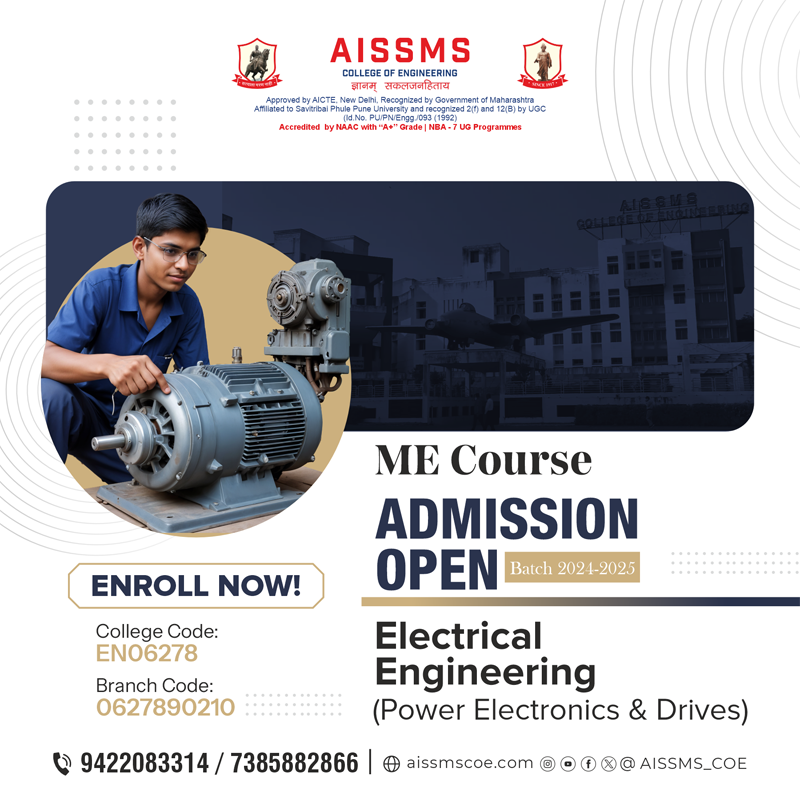Department Of Electrical Engineering



Since its inception in 1992, One of the Best Electrical Engineering College in Pune, India – AISSMS College Of Engineering has registered tremendous growth in teaching and research. The Department offers a regular four-year B.E program in “Electrical Engineering” and Post Graduate program M.E. in “Power Electronics and Drives” under affiliation of Savitribai Phule Pune University.
Intake of Electrical Engineering Department:
| Programme | Year of Establishment | Sanction Intake |
|---|---|---|
| UG – Electrical Engineering | 1992 | 60 |
| PG – Power Electronics and Drives | 2011 | 18 |
Vision:
- To be an excellent learning center in Electrical Engineering providing long term benefits to the society
Mission:
- To impart knowledge in the field of Electrical Engineering using contemporary learning tools
- To promote research culture among students and faculty
- To serve society with deep awareness of social responsibility and ethics
- To collaborate with industry for value addition in academics
Short-term Goals:
- To encourage faculty for upgradation of qualification
- To promote extensive use of ICT and advanced pedagogical methodologies for enhanced learning experience
- To increase activities that encourage lifelong learning and sustainability
- To improve industry- academia collaboration
Long-term Goals:
- To nurture an environment conducive for entrepreneurship development
- To receive funds/grants from central funding agencies
- Initiation of Research and Consultancy by involving Industry/Defense sector
Program Outcomes (POs):
Engineering Graduates will be able to :
Engineering Knowledge: Apply knowledge of mathematics, science, engineering fundamentals and an engineering specialization to the solution of complex engineering problems.
Problem Analysis: Identify, formulate, research literature and analyze complex engineering problems reaching substantiated conclusions using first principles of mathematics, natural sciences and engineering sciences.
Design/ Development of Solutions: Design solutions for complex engineering problems and design system components or processes that meet specified needs with appropriate consideration for public health and safety, cultural, societal and environmental considerations.
Conduct investigations of complex problems using research-based knowledge and research methods including design of experiments, analysis and interpretation of data and synthesis of information to provide valid conclusions.
Modern Tool Usage: Create, select and apply appropriate techniques, resources and modern engineering and IT tools including prediction and modeling to complex engineering activities with an understanding of the limitations.
The Engineer and Society: Apply reasoning informed by contextual knowledge to assess societal, health, safety, legal and cultural issues and the consequent responsibilities relevant to professional engineering practice.
Environment and Sustainability: Understand the impact of professional engineering solutions in societal and environmental contexts and demonstrate knowledge of and need for sustainable development
Ethics: Apply ethical principles and commit to professional ethics and responsibilities and norms of engineering practice.
Individual and Team Work: Function effectively as an individual, and as a member or leader in diverse teams and in multidisciplinary settings.
Communication: Communicate effectively on complex engineering activities with the engineering community and with society at large, such as being able to comprehend and write effective reports and design documentation, make effective presentations and give and receive clear instructions.
Project Management and Finance: Demonstrate knowledge and understanding of engineering and management principles and apply these to one’s own work, as a member and leader in a team, to manage projects and in multidisciplinary environments.
Lifelong Learning: Recognize the need for and have the preparation and ability to engage in independent and lifelong learning in the broadest context of technological change.
Program Specific Objectives(PSOs):
- PSO1: Demonstrate comprehensive knowledge and technical competence in analyzing and solving
problems related to Power and Energy Systems, Control and Drives - PSO2: Obtain industrial exposure through internship and hands-on training, enabling them to apply theoretical knowledge to real-world engineering practices and adapt to modern technologies.
- PSO3: Exhibit their abilities of soft skills and self-learning skills through teamwork, while emphasizing professional ethics
Course Outcomes
Program Educational Objectives
- Our graduates will be technically competent to solve engineering problems and demonstrate leadership skills at their chosen workplace
- Our graduates will exhibit professional and managerial skills while working in professional organizations and simultaneously acquire higher education as per job needs
- Our graduates will be sensitive to the contemporary techno-social issues and committed to serve the society locally and globally with strong ethics.